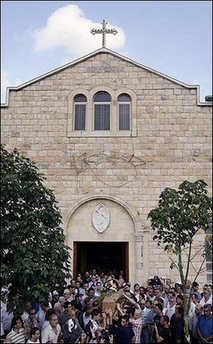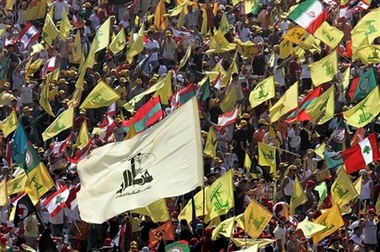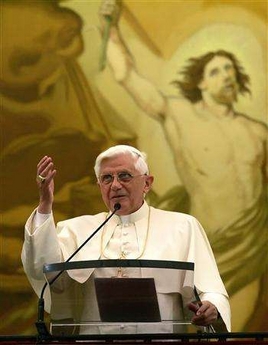 HARISSA, Lebanon (AFP) Sun Sep 24, - Anti-Syrian Christian leader Samir Geagea scoffed at Hezbollah's claims of victory in its devastating conflict with Israel, during a rally attended by tens of thousands. "We are the victors, and yet we do not feel it was victory but rather that a real catastrophe befell our country, and that our fate and destiny are at the mercy of the winds," said the Lebanese Forces (LF) leader and member of Lebanon's "March 14" group Sunday.
HARISSA, Lebanon (AFP) Sun Sep 24, - Anti-Syrian Christian leader Samir Geagea scoffed at Hezbollah's claims of victory in its devastating conflict with Israel, during a rally attended by tens of thousands. "We are the victors, and yet we do not feel it was victory but rather that a real catastrophe befell our country, and that our fate and destiny are at the mercy of the winds," said the Lebanese Forces (LF) leader and member of Lebanon's "March 14" group Sunday.
Crowds flocked to a hilltop Maronite cathedral in Harissa in the Christian heartland north of Beirut, site of a giant statue of the Virgin Mary, for a mass and to hear Geagea speak at the rally staged as a memorial for "martyrs" of his party members killed during Lebanon's 1975-1990 civil war.The Christian television network, LBC, close to the LF, said some 90,000 people were expected to flock to the scene, but an independent figure for the turnout was unavailable.
The rally came two days after Syrian-backed Shiite group Hezbollah held a giant demonstration in Beirut to celebrate "victory" in the July-August war with Israel."We are the victors because it was us who were demanding the (Lebanese) army's deployment (in south Lebanon), backed by UNIFIL (peacekeepers), while they were opposed," said Geagea, without naming Hezbollah.
 BEIRUT, Lebanon -Sept. 22 - By HUSSEIN DAKROUB, Hezbollah's leader Sheik Hassan Nasrallah made his first public appearance since his group's war with Israel began July 12, taking the stage Friday at a rally by hundreds of thousands of his supporters in Beirut's bombed-out suburbs. Nasrallah had called the rally to celebrate the "divine and historic victory" over Israel, and supporters packed a lot for an expected speech by the guerrilla leader.
BEIRUT, Lebanon -Sept. 22 - By HUSSEIN DAKROUB, Hezbollah's leader Sheik Hassan Nasrallah made his first public appearance since his group's war with Israel began July 12, taking the stage Friday at a rally by hundreds of thousands of his supporters in Beirut's bombed-out suburbs. Nasrallah had called the rally to celebrate the "divine and historic victory" over Israel, and supporters packed a lot for an expected speech by the guerrilla leader.
The crowd
Iran’s Expediency Council Chairman Akbar Hashemi Rafsanjani on Friday warned Israel against any new attack on Lebanon or it would face unprecedented …
 By Anne Applebaum , Already, angry Palestinian militants have assaulted seven West Bank and Gaza churches, destroying two of them. In Somalia, gunmen shot dead an elderly Italian nun. Radical clerics from Qatar to Qom have called, variously, for a "day of anger" or for worshipers to "hunt down" the pope and his followers. From Turkey to Malaysia, Muslim politicians have condemned the pope and called his apology "insufficient." And all of this because Benedict XVI, speaking at the University of Regensburg, quoted a Byzantine emperor who, more than 600 years ago, called Islam a faith "spread by the sword." We've been here before, of course. Similar protests were sparked last winter by cartoon portrayals of Muhammad in the Danish press. Similar apologies resulted, though Benedict's is more surprising than those of the Danish government. No one, apparently, can remember any pope, not even the media-friendly John Paul II, apologizing for anything in such specific terms: not for the Inquisition, not for the persecution of Galileo and certainly not for a single comment made to an academic audience in an unimportant German city.
By Anne Applebaum , Already, angry Palestinian militants have assaulted seven West Bank and Gaza churches, destroying two of them. In Somalia, gunmen shot dead an elderly Italian nun. Radical clerics from Qatar to Qom have called, variously, for a "day of anger" or for worshipers to "hunt down" the pope and his followers. From Turkey to Malaysia, Muslim politicians have condemned the pope and called his apology "insufficient." And all of this because Benedict XVI, speaking at the University of Regensburg, quoted a Byzantine emperor who, more than 600 years ago, called Islam a faith "spread by the sword." We've been here before, of course. Similar protests were sparked last winter by cartoon portrayals of Muhammad in the Danish press. Similar apologies resulted, though Benedict's is more surprising than those of the Danish government. No one, apparently, can remember any pope, not even the media-friendly John Paul II, apologizing for anything in such specific terms: not for the Inquisition, not for the persecution of Galileo and certainly not for a single comment made to an academic audience in an unimportant German city.But Western reactions to Muslim "days of anger" have followed a familiar pattern, too. Last winter, some Western newspapers defended their Danish colleagues, even going so far as to reprint the cartoons -- but others, including the Vatican, attacked the Danes for giving offense. Some leading Catholics have now defended the pope -- but others, no doubt including some Danes, have complained that his statement should have been better vetted, or never given at all. This isn't surprising: By definition, the West is not monolithic. Left-leaning journalists don't identify with right-leaning colleagues (or right-leaning Catholic colleagues), and vice versa. Not all Christians, let alone all Catholics -- even all German Catholics -- identify with the pope either, and certainly they don't want to defend his every scholarly quotation.
Khazen History


Historical Feature:
Churches and Monasteries of the Khazen family

St. Anthony of Padua Church in Ballouneh
Mar Abda Church in Bakaatit Kanaan
Saint Michael Church in Bkaatouta
Saint Therese Church in Qolayaat
Saint Simeon Stylites (مار سمعان العامودي) Church In Ajaltoun
Virgin Mary Church (سيدة المعونات) in Sheilé
Assumption of Mary Church in Ballouneh
1 - The sword of the Maronite Prince
2 - LES KHAZEN CONSULS DE FRANCE
3 - LES MARONITES & LES KHAZEN
4 - LES MAAN & LES KHAZEN
5 - ORIGINE DE LA FAMILLE
Population Movements to Keserwan - The Khazens and The Maans
ما جاء عن الثورة في المقاطعة الكسروانية
ثورة أهالي كسروان على المشايخ الخوازنة وأسبابها
Origins of the "Prince of Maronite" Title
Growing diversity: the Khazin sheiks and the clergy in the first decades of the 18th century
Historical Members:
Barbar Beik El Khazen [English]
Patriach Toubia Kaiss El Khazen(Biography & Life Part1 Part2) (Arabic)
Patriach Youssef Dargham El Khazen (Cont'd)
Cheikh Bishara Jafal El Khazen
Patriarch Youssef Raji El Khazen
The Martyrs Cheikh Philippe & Cheikh Farid El Khazen
Cheikh Nawfal El Khazen (Consul De France)
Cheikh Hossun El Khazen (Consul De France)
Cheikh Abou-Nawfal El Khazen (Consul De France)
Cheikh Francis Abee Nader & his son Yousef
Cheikh Abou-Kanso El Khazen (Consul De France)
Cheikh Abou Nader El Khazen
Cheikh Chafic El Khazen
Cheikh Keserwan El Khazen
Cheikh Serhal El Khazen [English]
Cheikh Rafiq El Khazen [English]
Cheikh Hanna El Khazen
Cheikha Arzi El Khazen
Marie El Khazen